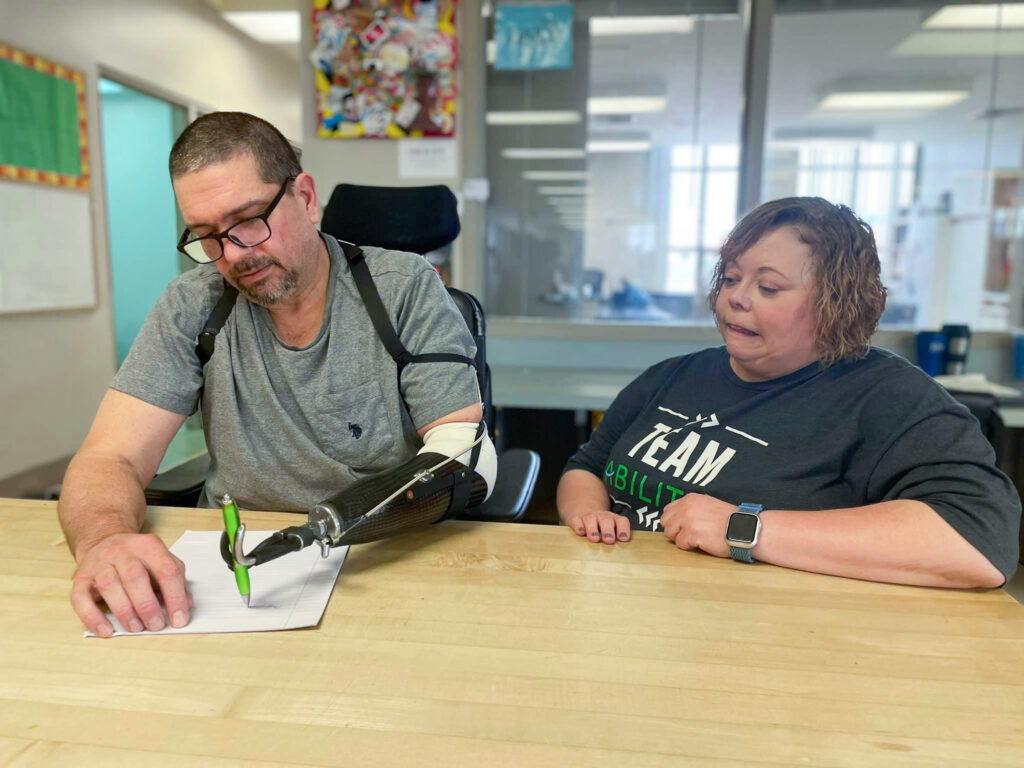
The loss of a limb affects more than just your physical being. It impacts your psychological and emotional health as well. A support system can help you along your recovery journey as you overcome new challenges. This journey may include using prosthetic arms.
Therapy is essential after limb loss. It’s not always a smooth road to the finish line of regaining independence and physical function. Having a comprehensive support team behind you as you learn to use a prosthetic arm can greatly enhance your journey toward achieving the best possible results.
Benefits of having peer support during therapy after limb loss
Peer support means sharing help or knowledge with those around you. It can look different based on the context that it’s being applied to. Peer support on a sports team can mean sharing encouragement with teammates. In social settings, it can mean being a shoulder for a friend to cry on when they’re going through a difficult time. While it may look different based on the situation or people involved, many of the benefits of support stay the same in every instance. That includes how to use a prosthetic arm during limb loss rehabilitation.
Becoming comfortable with using a prosthetic arm takes time and patience. It also takes lots of practice. If you become frustrated or upset with yourself or the process, your therapy team can support you.
There are many benefits from having a comprehensive therapy team to help while using a prosthetic arm, including:
- Validation — No one is going to say that dealing with loss of a limb is easy. When you voice your frustrations while trying to use your prosthetic, your team can make sure your concerns are heard and understood. You’ll know that it’s OK to feel the way you do.
- Comfort — Sometimes we need tough love, and sometimes we need to be comforted. After a limb loss, your therapy team can help ease the distress you’re feeling and show that there are people who can be there for you during tough times.
- Self-compassion — It’s possible to be too hard on yourself during a challenging time. Trying to learn how to use a prosthetic arm can be difficult, and you may become upset with yourself if you don’t feel like you’re making enough progress. Your therapy team can help you learn how to give yourself a break and be proud of every step.
- Motivation — Support can keep you motivated to give your all into treatment for the best results. When you’re using your prosthetic arm, the people around you can provide encouragement and help you believe in your own abilities.
A comprehensive therapy team, such as the one at Ability KC, enhances the outcomes of prosthetic arm rehabilitation by leveraging the benefits of support. This ensures that patients maximize their gains from the prosthetics, even when facing obstacles during their learning journey.
What peer support looks like during therapy for prosthetic arms
There are many types of therapies that patients who have experienced loss of a limb can benefit from, and each one provides peer support during every step and milestone in the recovery process. If the patient is using a prosthetic arm, here’s how peer support can help in different types of therapies:
- Prosthetic training — Since this is the main type of therapy used for prosthetic arms, it’s where peer support can have the greatest impact on the outcome. Throughout the training, experts will provide you with knowledge of how the prosthetic works, gently guide you through the proper motions and motivate you to keep practicing.
- Occupational therapy — By working with an occupational therapist for your prosthetic arm, you can learn adaptive strategies and techniques for using your prosthetic for everyday tasks, such as getting dressed. Support from your therapist can help you be kind to yourself when you don’t get a movement on the first shot or become frustrated with a new reality.
- Rehabilitation counseling — Addressing the mental and emotional toll of a limb loss and trying to learn how to adapt to a prosthetic arm are huge aspects of rehabilitation. That’s why one-on-one counseling, as well as group sessions, can make such a difference. You can come to terms with the loss and find support in people who are going through the same thing.
Ability KC’s therapy team provides peer support to help prosthetic arm outcomes
A support system is essential in every chapter of your life, especially during the challenging ones. If you’ve experienced limb loss and you’re at the beginning of your journey with a prosthetic arm, therapy plays a vital role in your overall wellness. At Ability KC, our comprehensive therapy team can help ensure that you’re continuously working toward getting the best results you can.
Ability KC is a designated Comprehensive Outpatient Rehabilitation Facility (CORF) with a Commission on Accreditation of Rehabilitation Facilities (CARF) accreditation. Contact our team today for more information or to schedule an initial appointment.